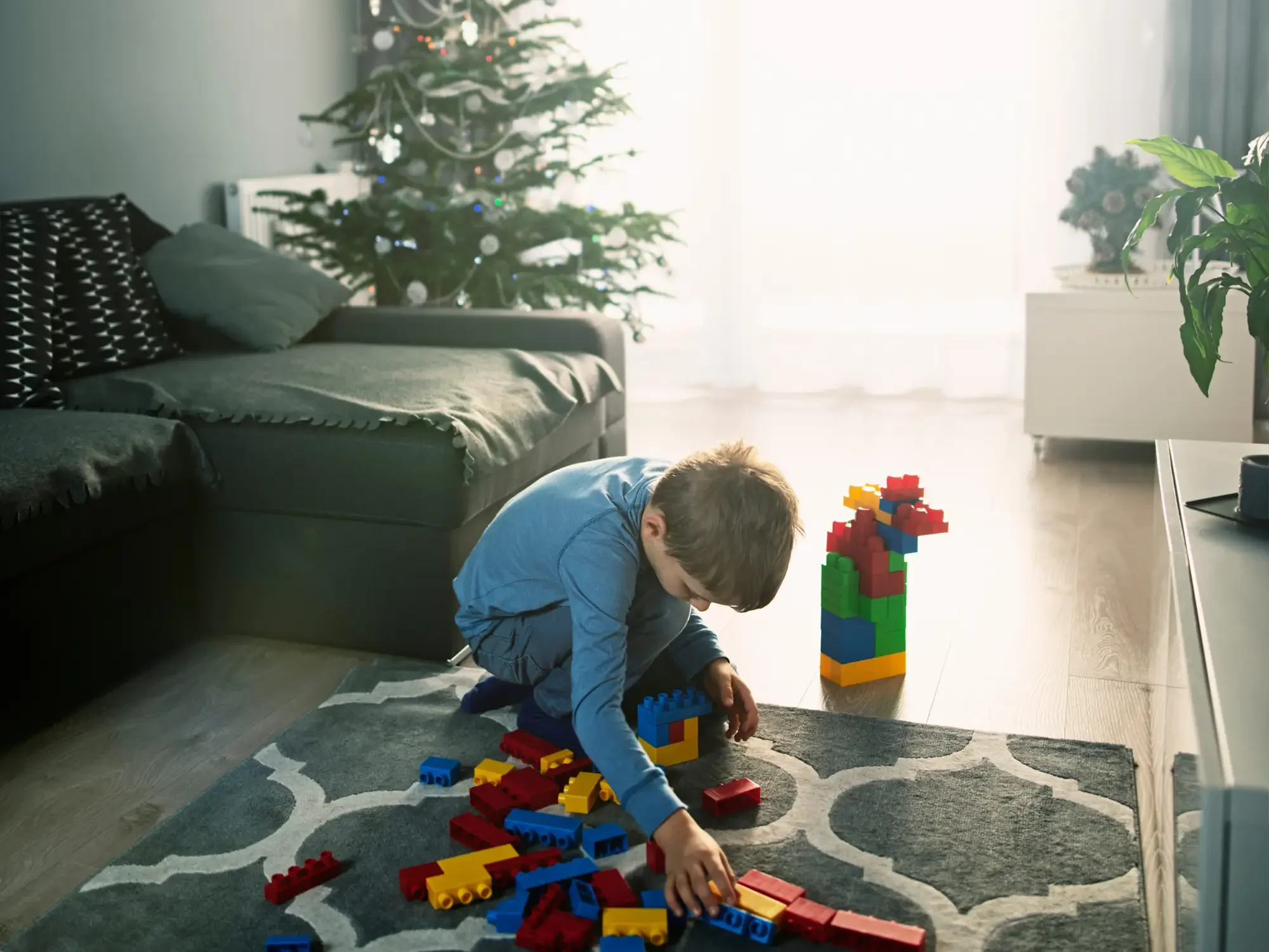A Letter to the Mom of a Neurodivergent Child (This Holiday Season)
By Dr. Colleen Reichmann, psychologist and clinical director of Wildflower Therapy
Dear Mom to a Neurodivergent Child,
Let me start out by just offering you a big hug. You know, one of those ones where you start out sort of polite and a stiffly hugging back, but the other person quickly shows you that-nope-this is a full-body embrace (and one that they will not let go of until you do).
I know how tired you are. I know that your mental load is beyond different from the load of other parents- so different, in fact, that you have probably stopped trying to talk about it with your mom friends of neurotypical kids. As the holidays approach, I want to take a moment to reach out to you, because I know that exhaustion is catching up. I know that your heart holds the fiercest love, and the deepest fatigue. I know you have started scrolling through those perfectly posed holiday-themed family photos, and are feeling the pang of something complicated when doing so. I know that this season of holidays on top of holidays, bright lights, big crowds, disrupted routines, and endless expectations- brings a unique kind of heaviness for you.
I see you.
I see the way you show up again and again for your child, even when others misunderstand. I see how often you’re forced to translate, to explain, to smooth over. How often you have to listen to comments from relatives, or strangers. I see you attending the parent-teacher conferences and IEP meetings, and then crying on the way home. I see your exhaustion of worrying about how the world perceives your child (perhaps as a “behavior kid”) and, in turn, how they see your mothering.
Here is the truth, friend. Parenting a neurodivergent child in a world that often only celebrates “typical” can be profoundly isolating. It is a truth that demands to be spoken- and one that doesnt at all have to do with how grateful you also feel for your child’s existence.
The Weight of Being Misunderstood
Maybe your child has ADHD, autism, sensory processing differences, or another neurodivergence that makes navigating social, educational, and family spaces more complex. Maybe you’ve been told they’re just mainly “oppositional,” “defiant,” or “a behavior problem.” Maybe people have said, “If only you were firmer,” or “He just needs consequences,” or “She’s manipulating you.” I have certainly seen all of the reels online from education professionals talking about bigger behaviors in the classroom from this generation of children, and they almost always seem to tie these issues back to how badly most of us are likely parenting. I know those reels hit different when you are the mother of one of those kids that they are talking about.
But those comments are so deeply uneducated in my opinion. Neurodiverent brains process the world differently. So they respond differently to various situations- sometimes in ways that seemingly look odd, “out of nowhere” or purely oppositional. But it is the height of hubris, in my opinion, for adults to decide that we know everything about the behaviors and responses from children. Behavior is communication. It may be unprovoked *as you see it* but we don’t live in their minds! Neurodiveregent children are so often simply communicating overwhelm in a world that feels too loud, too fast, too confusing, too unpredictable, or just too upsetting. I deeply wish the world understood this.
And you know this, because you have lived it. You alone have been the main detective and observor of your child from day freaking one. You alone carried the nagging thoughts far before you verbalized them. You have come to understand that your child’s meltdowns, refusals, or moments of withdrawal are not acts of rebellion, they’re signals of overwhelm, dysregulation, or distress. But knowing that doesn’t always make it easier when everyone around you seems to expect something different. When family members shake their heads at your choices. When your child’s school calls again, implying that if you were just more consistent, your child’s behavior would change. When the recommendation for PCIT (that you aready tried) is floated for the 15th time. When you find yourself crying quietly in the car after yet another difficult day, wondering if it really is just you- if maybe you really are just messing up.
Please lean in close as I say this next part- you are a good mom. The best mom. You are a mom shouldering such an invisible load, and you’re doing it daily. You are showing up in a thousand ways, over and over, and trying for your child (perhaps even while the messages from the world feel like they are constantly beating your self-esteem down)
There is not a perfect parent among us. I can assure you that. But good thing we don’t have to be perfect to be devoted, attuned, loving, and to deeply celebrate our children (and to constantly search for ways to understand and support their unique needs.) Your mothering is sacred work.
Parenting Doesn’t Look the Same for All of Us
The idea that there’s one “right” way to parent or to be “a good mom” has got to be one of the most harmful myths modern mothers have been handed.
For moms of neurodivergent kids, the parenting playbook that works for everyone else often doesn’t apply. The advice from the latest parenting expert, the gentle nudges from well-meaning friends, even the routines that seem to work for other families often just fall flat. I can’t tell you how many mothers I sit with that have said “I have bought so many of the books but it just feels like literally nothing works..” If you feel this way, know that it’s because your child’s brain is wired differently. Their needs, sensitivities, and stress responses don’t fit neatly into mainstream expectations. And that means your parenting might not look the same either.
There may be no time when this is highlighted quite as clearly as during the holidays. You may have to plan your family’s holidays around sensory overload, build in extra quiet time, or skip big gatherings altogether. You might have to accommodate your child’s food preferences when everyone else insists “they’ll eat what’s served.” You may have to dodge grandparent questions about why they can’t just sit at the table and finish a meal- you always did, after all! (insert eye roll.) You might leave a family dinner early to prevent a meltdown, or decline invitations to events that would push your child past their limits.
And you might notice the looks. The subtle disapproval. The sense that others think you’re not being firm enough. But what they don’t see is that your choices are acts of fierce love. They’re examples of attuned, responsive parenting- and parenting that values your child over how you, as the parent, are perceived. This is what it means to truly honor your child’s nervous system, their humanity, and your own sanity.
At Wildflower Therapy in Philadelphia, where we specialize in maternal mental health and neurodivergent-affirming therapy, we often remind mothers that accommodating your child is NOT spoiling them, it’s supporting them. It’s the opposite of permissive. It’s intentional. It’s parenting in alignment with your child’s real needs, not society’s expectations. AND, it is uniquely hard for parents of neurdivergent kids to have to ask themselves whether this is a moment to accomodate vs. a moment to gently push them in order to help them build resilience for a world that was not made for them. This constant weighing of which side of the balance beam to step onto is an energy tax that other parents simply don’t have to shoulder in quite the same way. (And yes, you are allowed to acknowledge that.)
The Holidays Bring Pressure-BUT Please Know That YouDON’T Have to Perform
The holiday season, for many families, is a swirl of sensory chaos-flashing lights, new foods, changes in routine, unfamiliar smells and textures, relatives coming and going. For neurodivergent children, all of this can be overwhelming.
And for moms, especially those who already feel like they have to justify their parenting, it can be a perfect storm of stress and self-doubt. You might feel pressure to keep up traditions that don’t work for your family anymore, or anxiey about attending big family meals where you know your child’s behaviors will be misunderstood. You might feel sadness watching other families do things that yours can’t easily do. If this sounds familiar, please take this as permission to let your holidays look different.
You are not failing if you need to create new traditions.
You are not failing if you skip the big dinner to protect your child’s regulation.
You are not failing if you bring separate foods that your child will eat.
You are not failing if you leave early, say no, or choose calm over chaos.
You are honoring your child’s needs (and maybe your own, too!)
What matters most this season isn’t how well you perform holiday magic for others. It’s how safely your child feels held within your love, and how well you hold on to your own small semblance of regulation throughout it all.
Your Child Is Not Broken
It can be easy to internalize the messages that your child’s struggles are a reflection of your parenting, or that if you were just more consistent or patient or clever, things would go more smoothly.
But please hear me when I say that your child is not broken. Your family is not broken.
You are raising a child whose brain sees and processes the world in a different way (Yes, even if your child is incredibly high masking, and one that less nuanced professionals have disregarded-“There is no way she’s autistic, look at her eye contact!”) Their differences come with both challenges and gifts. Yours is a child who may notice beauty in small details, think creatively, and experience emotions in technicolor ferocity. You are not meant to erase their difference. You are meant to help them live in a world that doesn’t always understand it.
That means refusing to carry the shame society tries to hand you.
That means knowing that your family’s version of “normal” doesn’t need to look like anyone else’s.
That means trusting yourself, even when others doubt you.
This kind of parenting (the kind that resists shame and chooses attunement) is some of the bravest work there is.
Holding Space for Your Own Emotions
It’s easy to focus so completely on your child’s needs that you forget your own. But being a mom to a neurodivergent child comes with a deep emotional load-grief for how misunderstood your child can be, anger at how systems fail them, guilt for the moments you lose your patience, exhaustion from constant advocacy, and the list goes on.
These feelings are normal. They don’t make you weak or ungrateful. They make you human.
This season, give yourself permission to grieve what’s hard. To feel the ache of comparison. To admit that sometimes this is just plain exhausting.
And when you can, reach for support.
Small Reminders for the Holiday Season
If your holidays often feel heavy or complicated, try to hold onto these reminders:
Your child’s behavior is communication. Hold space for your own humaness when you lose your patience, and also strive to respond from a place of curiosity as much as possible (I personally think the calmly stated question “What were you trying to do there?” is gold for neurodiveregent kids who struggle with impulsivity or confusing behaviors)
Your family doesn’t have to do things “the traditional way.” There is no universal right way to celebrate.
Accommodations are not indulgent, they are compassionate. You are building trust, not spoiling your child.
Comparison steals joy. Your child’s progress and peace matter more than appearances.
You are allowed to rest. You do not have to be everything for everyone.
You are enough. Even on the days that feel like too much.
A Holiday Grounding Practice for Moms
Here’s a small grounding exercise that might help you through the season:
Pause and breathe. Place your hand over your heart. Feel the warmth under your palm.
Name what’s real. Say softly to yourself: “This is hard. And I am still doing my best.”
Remember what matters. Picture your child’s face when they are grown. They are reflecting on how you tried your best, even in all of your humaneness and moments of impatience- to help them feel understood, safe, and loved. That’s your compass.
Release the rest. Imagine letting go of the expectations that don’t serve you-the ones about how your child “should” act or how your family “should” look.
Return to the present moment. The smell of something baking. The sound of laughter in another room. The small, ordinary joys that belong to you.
This is where the real magic of the holidays lives. Not in perfection, but in presence.
You Are Raising a Wildflower
At Wildflower Therapy, we named our practice after the wildflower because it grows in unlikely places. It doesn’t follow a straight path or bloom on anyone else’s timeline. It simply finds its way toward the light, again and again.
You are that wildflower, too. You are growing strength in the cracks of a system that wasn’t built for your family. You are finding beauty amid exhaustion. You are learning to root yourself in love, not shame.
And your incredible, complex, (sometimes crazy-making), beautifully-wired child, is learning from you what it means to belong just as they are. This holiday season, may you hold tight to that truth.
You are a good mom.
Your child is not broken.
Your love, your advocacy, and your courage are building a softer, safer world for them, and for you.
With warmth and solidarity,
Dr. Colleen Reichmann and the Wildflower Therapy Team
Neurodivergent-Affirming Therapy, Eating Disorder Therapy, & Maternal Mental Health Support in Philadelphia
Please Reach Our For More Support!
At Wildflower Therapy, our team of therapists in Philadelphia help moms of ADHD kids and/or autistic kids to shoulder the unique emotional landscape of parenting neurodivergent kids. We offer neurodivergent-affirming therapy for mothers who are navigating burnout, shame, and overwhelm, because you deserve a space that centers you, not just your child.
Sometimes, the most healing thing you can do for your family is to care for yourself. Please reach out today for a free 30 minute consultation call. We also specialize in eating disorder and body image therapy in Philadelphia (or virtually across Pennsylvania, New Jersey, Delaware, Florida, South Carolina, Vermont, Virginia, Ohio, and Massechusetts) and help individuals rebuild a peaceful relationship with food and body.



